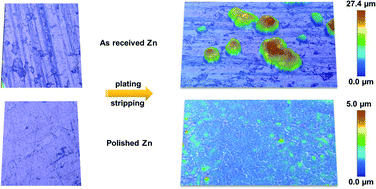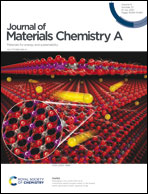Dendrite suppression by anode polishing in zinc-ion batteries†
Abstract
Aqueous zinc-ion batteries (ZIB) with Zn metal anodes are promising candidates for future electrochemical energy storage devices. However, Zn dendrite growth greatly limits their practical application. Many recent studies have developed methods to hinder dendrite formation and growth, including interfacial barrier layers, alternative anode and cathode materials, new electrolyte chemistries, or complex structured separators. However, relatively little attention has been paid to the structure of the Zn foil itself. Herein, by simply polishing the Zn foil before electrochemical operation, the morphological uniformity and reversibility of the deposited Zn layer on the metal anode is significantly improved during cycling, compared to that of as-received Zn foils. By combining ex situ optical microscopy (OM) and in situ electrochemical atomic force microscopy (EC-AFM), it is demonstrated that the initial roughness of the Zn foil electrode surface defines the subsequent plating/stripping morphology. The use of flatter foil anodes notably increases ZIB cycle life. This methodology offers a simple and industrially scalable route to wider ZIB utilisation, as well as highlighting an important consideration for future battery research.



 Please wait while we load your content...
Please wait while we load your content...